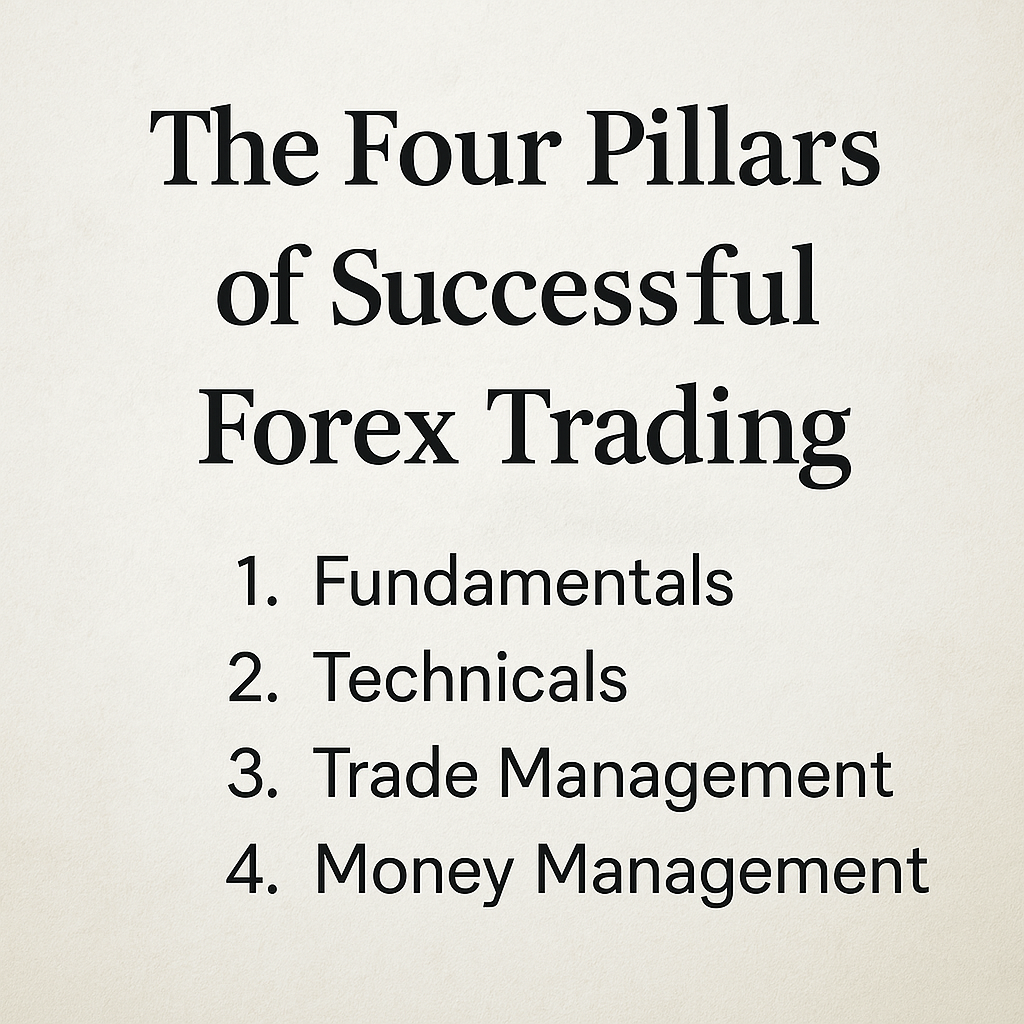I think mastering the Forex markets is an endless pursuit of refinement, strategy, and above all — understanding reality.
Too often, traders get hypnotized by charts, indicators, and complex technical setups, chasing shadows while the real power behind the market — the fundamentals — steers price over weeks, months, even years. I know, because I’ve been there.
If you’re serious about long-term success, it’s time to anchor your trading around fundamental analysis.
Let’s dive deep.
The Edge: Strategy Meets Preparation
In Forex, your true edge is not just in how you read charts — it’s how you apply your own knowledge, preparation, and strategy to what the market reveals.
Success isn’t luck. It’s recognizing the opportunity because you did the homework — and then hitting it hard with no regrets.
The Four Pillars of Successful Forex Trading:

Most traders overemphasize technicals. Big trends and reversals are fundamentally driven.
If you can align your trading around fundamentals and use technicals for timing, you will be more consistent, more confident, and more profitable.
Mastering Fundamentals: Top-Down and Bottom-Up
There are two levels to understanding fundamental analysis:
1. Macro Fundamentals (Top-Down Approach; how I do it)
The BIG forces that shift entire economies and currencies.
Focus on:
- Employment
- Inflation
- Growth
- Major political and economic policies
Large institutions like hedge funds and asset managers rely on Macro-Fundamental Analysis because it provides structure — a framework for understanding the big picture.
Major Macro Events that Move Forex:
- Fiscal Policies: Tax changes, spending plans
- Monetary Policies: Central Bank interest rate decisions
- Elections: Political instability = market volatility
- Bond Yield Auctions: Predict interest rate expectations
- Central Bank Interventions: Direct manipulation of currency value
2. Micro Fundamentals (Bottom-Up Approach)
The day-to-day developments that cause short-term moves.
Focus on:
- News headlines (Bloomberg, Reuters)
- Central bank commentary
- Mergers & Acquisitions (M&A)
As a trader, you should constantly ask:
“How does this event impact the currency I’m trading?”
Key Economic Concepts Every Trader Must Know
Expansion vs. Recession
Recognizing where an economy is in its cycle is crucial.
Expansion brings stronger currencies:
- Rising GDP
- Higher employment
- Increased spending
Recession weakens currencies: - Falling GDP
- Higher unemployment
- Decreased spending
Inflation & Deflation
- Inflation: Too much money chasing too few goods.
- Deflation: Too little money chasing too many goods.
Watch indicators like CPI (Consumer Price Index) and PPI (Producer Price Index).
GDP: The Ultimate Health Check
Gross Domestic Product is the total value of goods and services produced in a country.
The formula:
GDP = Consumption + Investment + Government Spending + Net Exports
(C + I + G + NE)
Rising GDP = Strong currency.
Falling GDP = Weak currency.
Balance of Payments
A record of a country’s transactions with the world.
- Surplus = Currency strength
- Deficit = Currency weakness
Trade and Capital Flows also influence currency trends. Money moves to where it’s treated best — strong economies, high interest rates, and political stability.
Why Bonds Matter to Forex Traders
Bonds and currencies are closely linked.
Key Points:
- Bond prices and bond yields are inversely correlated.
- Higher bond yields = Higher currency value (usually).
- Lower bond yields = Demand for safe-haven currencies (USD, JPY, CHF).
Bond Spreads, the difference between two countries’ bond yields, act as a leading indicator for currency moves.
A widening spread signals potential currency appreciation.
Example:
If U.S. bond yields rise compared to Europe, expect USD to strengthen against the Euro.
Macro Trading: A Long-Term Mindset
Trading based on Macro-Fundamental Analysis is about anticipating where economies — and therefore currencies — are heading.
Why focus on Macro?
- Macro events override short-term noise.
- Macro trends develop methodically over weeks and months.
- Institutional money moves based on macro — so should you.
The Central Banks: The Real Market Movers
Always watch the Central Banks.
Their Focus Areas:
- Inflation
- Employment
- Growth
- Production
Their Tools:
- Interest rate changes
- Reserve requirement adjustments
- Open market operations (buying/selling bonds)
- Direct currency interventions
- Quantitative easing (money printing)
Learn to interpret Central Bank communications.
If you can anticipate their next move, you’re already trading with the big players.
A Practical Macro Trading Process
Here’s how to put it all together:
- Check Your Charts
Analyze price action on 1H, 4H, Daily, Weekly, and Monthly charts. - Do the Research
Investigate WHY the currency moved.
Use the C.C.R.P. Method:- Currency in focus
- Course (strengthening/weakening)
- Reason (preferably Macro reason)
- Projection (future expectations)
- Check the Macro View
Align short-term movements with the longer-term fundamental picture. - Check the Micro View
Be aware of scheduled news releases that could temporarily shake the market. - Get the Entry
Use technicals to find ideal entries (Supply & Demand Zones, Trendlines). - Manage the Trade
- Always use stop losses.
- Protect profits (partial take-profits, move stops to break-even).
- Never move stops against you.
- Avoid holding large positions into major Central Bank events.
Important Tips
- Watch how the market reacts to news, not just the news itself.
- Stay informed with Bloomberg or Reuters in the background.
- Be patient — real moves take time to develop.
- Trade only when you’re in the right emotional and physical state.
- Focus on building your account slowly but steadily.
Final Thoughts
Trading based on Macro Fundamentals gives you structure, clarity, and control.
You’ll trade less, but trade better.
You’ll stop chasing the market — and instead, position yourself where the market is going.
One well-researched trade can make your entire month.
Trade smart. Stay patient. Trust the process.
The battlefield is vast — but with preparation, you will be victorious.
Become a member for deeper analysis and data
Takezo Trading